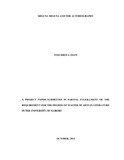| dc.description.abstract | In this project I have critically examined Miguna Miguna and the autobiography. I have
interrogated how Miguna Miguna employed the autobiographical form in his personal
narratives. I sought to examine the truth-value of Miguna Miguna in his memoir Peeling
Back the Mask: A Quest for Justice in Kenya and its sequel Kidneys for the King: de-
FORMING the Status Quo in Kenya. I have also evaluated the author’s fidelity to the
genre; and I have also examined the literariness of the two texts. The study was based on
the assumptions that distortion of facts undermined the reliability of Miguna Miguna’s
personal narratives. The other assumption that was explored was that the author
disregarded the crucial tenets of autobiography. I also hypothesized that Miguna Miguna
misused the autobiographical genre and this undermined the literary value of his writings.
I collected the data by doing library research where books and other materials from the
archives were used. I also collected some data by interviewing some selected people and
institutions. The close textual reading and desktop research were also done to help gather
the data. After the collection of the data the analysis was done. I found that Miguna
Miguna’s memoir is a very important narrative that has some positive values in it. The
memoir gives the readers some important insights into what happens behind the scenes in
our political institutions. It also gives the readers some inside stories of how our leaders
behave and on how they play their political games, in what can only be described as their
exclusive club. Through Miguna’s personal narrative, the myth that surrounds these
political institutions is dispelled. The distrust that became the preoccupation of the two
principals is laid bare. The readers, through Miguna’s personal narratives, are able to
discern that all the unity and coalition talks were nothing but a charade to hoodwink
Kenyans. However, I found that Miguna Miguna disregarded the crucial tenets of
autobiography. I found out that Miguna Miguna did not mind about facts and this
undermined his truth-value. And this also demonstrated his lack of fidelity to the genre.
This misuse of the autobiographical genre undermined the literary value of Miguna
Miguna’s writings. Miguna Miguna does not care about breaking the rules that created
the genres. This in itself effectively affects the form to which his writings belong, and
this by extension affects the literary value of his work | en_US |

